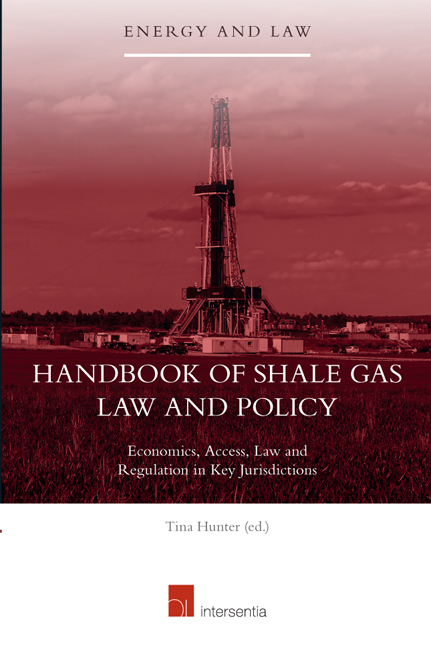Book contents
- Frontmatter
- Preface
- Contents
- List of Tables and Figures
- List of Authors
- Part I Overview and Introduction to Shale Gas Activities
- Part II Shale Gas Economics and Energy Security
- Part III Access to Shale Gas Resources
- Granting of Shale Gas Licences, Land Access and Property Rights in North America
- Granting of Shale Gas Licences, Land Access and Property Rights in Australia
- Shale Gas Licensing in the United Kingdom
- Part IV Shale Gas Law and Regulation
- Part V The Future of Shale Gas in the United Kingdom
- Index
Granting of Shale Gas Licences, Land Access and Property Rights in Australia
from Part III - Access to Shale Gas Resources
Published online by Cambridge University Press: 21 September 2018
- Frontmatter
- Preface
- Contents
- List of Tables and Figures
- List of Authors
- Part I Overview and Introduction to Shale Gas Activities
- Part II Shale Gas Economics and Energy Security
- Part III Access to Shale Gas Resources
- Granting of Shale Gas Licences, Land Access and Property Rights in North America
- Granting of Shale Gas Licences, Land Access and Property Rights in Australia
- Shale Gas Licensing in the United Kingdom
- Part IV Shale Gas Law and Regulation
- Part V The Future of Shale Gas in the United Kingdom
- Index
Summary
INTRODUCTION
In Australia although there is legislation relevant to petroleum, there is currently no specific legislation dealing with the exploration and production of shale gas. Unless subsequent regulatory legislation specifically focused on the production of shale gas is enacted, once shale gas extraction commences it will be regulated based upon general legislation dealing with petroleum which includes shale gas. This chapter will deal with who owns petroleum in Australia, the nature of and the process for the awarding of shale gas licences and the implications for titleholders and landholders in relation to rights to access land for the purpose of producing petroleum. Since Australia is a Commonwealth of six states and two territories, and the issue of production of onshore petroleum including shale gas is primarily a state matter, each state has a diff erent though similar legislative framework. As the major shale gas deposits are found in the states of Queensland, Western Australia, South Australia and the Northern Territory the primary focus of this chapter will be on these jurisdictions.
COMMON LAW AND STATUTORY RIGHTS TO OWNERSHIP OF MINERALS AND PETROLEUM
At common law a landowner had the right to minerals and geothermal resources found below the surface other than gold and silver, which were always regarded as the prerogative of the Crown, unless the Crown reserved the right to minerals in the deed of grant. The common law definition of ‘mineral’ is very broad and may include a substance like shale gas. In any event in most cases in Australia the common law right to minerals vested in the private landowner has been abrogated by statute in favour of public ownership of minerals and petroleum. The petroleum legislation in Queensland, South Australia, Western Australia and the Northern Territory provides that the state owns all petroleum, granting the state the entitlement to authorise others to carry out petroleum-related activity on that land through the issuing of licences and leases for the exploration and production of petroleum.
As shale gas is a hydrocarbon it is petroleum, and therefore falls under the petroleum regulatory regimes of the states.
- Type
- Chapter
- Information
- Handbook of Shale Gas Law and PolicyEconomics, Access, Law and Regulation in Key Jurisdictions, pp. 157 - 172Publisher: IntersentiaPrint publication year: 2016



